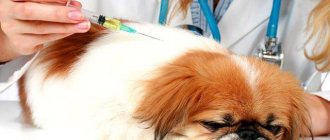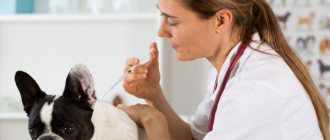Unfortunately, dogs are not immune to viruses and infections. Yorkshire Terriers are no exception in this regard. For healthy growth and development, your pet must have vaccinations. Preventive vaccination not only makes it possible to protect a pet from many diseases, but also allows the owner to feel protected. After all, many infectious diseases can be transmitted from dogs to humans.
Basics
The immunity of newborn puppies is the result of feeding on mother's milk, which protects them from the effects of infections and diseases.
At the end of the lactation period, this protection gradually disappears, replaced by immunity that the puppies develop on their own.
Any vaccination has several basic rules:
- The pet must be absolutely healthy. A recent illness is the reason for a two- or three-week quarantine, which gives the dog’s body time to recover.
- You cannot vaccinate a pregnant or lactating bitch. During pregnancy, childbirth and feeding, the bitch's body experiences serious stress and needs rest. The best time to vaccinate a bitch is 2-3 weeks before mating.
- You should not vaccinate your puppy too early. Vaccination performed before the antibodies obtained from the bitch's milk have stopped working will not work, which will increase the risk of infection.
- Be sure to use the same drug for vaccination and revaccination.
- For 3 days before vaccination, it is necessary to carefully monitor the pet’s condition: he should have a cold and wet nose, a body temperature of 39 degrees, a good appetite and the usual level of activity.
Vaccination is the causative agent of the disease, and not a method of treating it; vaccinating an unhealthy dog can be fatal.
Things to remember
The owner of a Yorkie should take the following into account:
- vaccination is carried out only under sterile conditions;
- The dog’s immunity after vaccination remains for 12 months;
- Vaccination of bitches is carried out 14-20 days before mating.
Immune protection is formed 1.5 weeks after vaccination.
Immunity acquired through vaccination lasts up to 12 months.
The body of bitches carrying offspring is under extreme stress. Therefore, vaccination is possible only after the pregnancy has been delivered and the lactation period has ended.
If the Yorkie is a breeding dog and is expected to participate in exhibitions, then routine vaccinations should be carried out only in state veterinary clinics. Passport stamps made in private clinics are not taken into account at exhibitions.
Protection
The standard vaccination schedule includes the use of vaccines against the following diseases:
- Rabies . As a result of this disease, paralysis and death of the dog occurs, in addition, it is dangerous for humans.
- Hepatitis. The development of the disease is caused by a virus. There is damage to the liver, stomach and intestines, inflammation of the respiratory system, damage to the central nervous system, and the possibility of symptoms of conjunctivitis cannot be excluded.
- Parvoviral gastroenteritis . A characteristic sign of the disease is diarrhea mixed with blood and high fever.
- Plague. The disease, which often ends in the death of the pet, is accompanied by apathy, lethargy and convulsions.
- Leptospirosis. This disease is caused by parasites and the dog suffers from diarrhea, abdominal pain and high fever.
Notes on each vaccination performed must be included in the dog’s veterinary passport.
The choice of drug for vaccination depends on the owner of the Yorkie. The most commonly used are Eurikan and Nobivak.
Schedule depending on age, frequency
| Age | Vaccine purpose |
| 8 - 9 weeks | Protection against enteritis, plague, hepatitis, parainfluenza, adenovirosis, coronavirus, leptospirosis, microsporia and trichophytosis |
| 10 - 11 weeks | Repeat vaccination against microsporia and trichophytosis |
| 3.5 months | Revaccination against enteritis, distemper, hepatitis, parainfluenza, adenovirosis, coronavirus, leptospirosis |
| 4 - 5 months | Rabies vaccination |
| Six months | Revaccination against enteritis, distemper, hepatitis, parainfluenza, adenovirosis, coronavirus, leptospirosis |
Then all vaccinations are repeated when the dog reaches one year of age and then they must be done once a year at the same time, the maximum possible interval between vaccinations is 1 week.
Procedure
The procedure must be performed by a doctor. This is especially true for puppies. Improper vaccination can lead to disastrous consequences. Before starting the procedure, the veterinarian must measure the temperature, conduct a visual examination of the mucous membranes, and listen to the rhythm of the heartbeat.
After an illness, it is better to get tested to make sure that all indicators are back to normal.
Vaccination must be carried out in a clinic that is licensed for such activities.
Especially vaccinations up to a year, against rabies. In Eastern Europe, the situation regarding this deadly disease is unfavorable. Cases of encounters with infected wild animals are recorded every now and then. Therefore, this procedure is annual.
Sequencing:
- Using a sterile syringe, inject the diluent into the vaccine vial.
- Shake the mixture vigorously until smooth.
- Take the entire composition without any residue into the syringe.
- Disinfect the injection site.
- Fix the dog and administer the vaccine.
- Treat the injection site.
If you have doubts about the status of the clinic, it is better to contact a state hospital. They vaccinate against rabies for free, with the necessary registration.
Important: the implementation of vaccinations in a clinic setting is also dictated by the Yorkie’s allergies. A reaction to the drug may occur, including anaphylaxis. Only a doctor can help the dog.
If an allergy has already occurred, the dog is given an antihistamine 1.5 hours before vaccination. If your veterinarian doesn't know about the allergy, be sure to let him know about your pet's allergies.
There is an opinion that dogs that have reached 8-9 years of age do not need to be vaccinated. They have developed a strong immunity to diseases. This is wrong. Cases have been recorded of older dogs becoming infected with enteritis, plague and other diseases dangerous for their age. You should not expose your pet to the risk of infection.
note
Vaccination, especially the first one, should take place in a veterinary clinic under the supervision of a doctor. This need is due to the likelihood of an allergic reaction and even a state of severe anaphylaxis in the Yorkshire Terrier due to the administered drug. In this case, the veterinarian will be able to quickly provide the dog with the necessary assistance.
To prevent allergies, the animal is given ¼ of an antihistamine tablet - Suprastin or Tavegil - before vaccination.
Revaccination should be carried out with the same drug as the first vaccination. If you vaccinate your dog yourself, before purchasing the vaccine, you must check its expiration date. Then read the instructions and follow all prescribed storage conditions, otherwise the medication may lose its properties.
How to determine whether a puppy is healthy or sick
Before vaccinating puppies, you must be 100% sure that the dog is healthy. Let's look at the main signs of the health indicators of the Yorkshire Terrier:
- check your pet's nose - it should be cold and damp;
- Just like humans, a dog's body temperature can rise. For a Yorkie, the normal temperature is 39 degrees;
- passivity, sluggish movements are also the first indicators of the disease;
If anyone else thinks that everything will work out and the first vaccination will not be needed, then let’s look at the options for diseases that standard vaccination saves from: distemper, or as they say scientifically “carnivore plague”, inflammation of the small intestine and gastrointestinal tract and many other unpleasant ones infections.
Vaccination prevents the occurrence of distemper
If we talk about when to give the first vaccination to a Yorkshire Terrier, then we should also take into account the fact that puppies are mainly bought from a breeder, and all this responsibility falls on their shoulders. Therefore, before purchasing, check the vaccination information. Until a year old, a Yorkie receives approximately 6 vaccinations.
The very first
The first vaccination should be given to the Yorkshire Terrier at the age of 8, maximum 9 weeks, it is intended to protect against diseases such as:
- Enteritis.
- Plague.
- Hepatitis.
- Parainfluenza.
- Adenovirus.
- Coronavirus.
- Leptospirosis.
- Microsporia and trichophytosis.
If the puppy has just arrived at a new home and it’s time to vaccinate it, you should wait a few days, giving the baby time to recover from stress and adapt to new conditions.
Lump formation
This phenomenon is not dangerous if it is just swelling of the injection site. Warning factors are:
- increase in the size of the cone;
- redness and infection;
- pain and discomfort;
- purulent discharge at the vaccination site
- fever for more than 3 days.
These manifestations require contacting a doctor.
You can avoid compaction by calming your pet before vaccination, using special syringes for dogs, and administering the drug professionally and slowly.
Preparing for the injection
For vaccination to be successful, the Yorkshire Terrier must be prepared for it.
If necessary, you must get rid of fleas 2 weeks before the vaccination date, and you cannot bathe your pet a day before the procedure.
One of the most important preparation points is timely deworming.
10 days before vaccination, you should get rid of worms using one of these drugs:
- Drontal.
- Vacation.
- Febtal.
- Prazicide - suspension.
Deworming should be carried out in the first half of the day, about half an hour before feeding or an hour after eating.
Optimal timing of vaccination
In the Russian Federation, vaccination against rabies is strictly mandatory. It needs to be installed every 12 months.
You should not vaccinate immediately after purchasing a puppy. First you need to give him time to adapt to new conditions.
Before the first vaccination, you need to closely monitor your pet. If the animal is active enough, eats well, and there are no signs of disease, vaccination can be done. Otherwise, you must first examine the dog and cure the diagnosed disease.
Preparing for the injection
10 days before vaccination you need to remove the worms.
Before vaccination, your Yorkie should be dewormed with Prazicide or another drug.
For this purpose the following is prescribed:
- Drontala;
- Febtala;
- Prazicide suspensions.
There is a fake Drontal on the market. Therefore, you need to purchase medicine only from “your” veterinarian, or from a trusted veterinary pharmacy.
Yorkies need to be wormed not only before vaccination, but throughout the year. Veterinarians recommend doing this 1 time/3 months.
It is advisable to carry out the procedure in the first half of the day, before feeding. You can also worm your dog 60 minutes after feeding. Additional conditions are discussed with the veterinarian individually.
It is impossible to remove worms from sick animals, pregnant and lactating bitches. Otherwise, the animal’s health condition will worsen. There is also a risk of fetal death.
If deworming is not carried out, the vaccine will not work.
When is the best time to vaccinate?
The first vaccination is given to a Yorkie at the age of 8-9 weeks. After 14 days, the procedure is repeated.
Important. If the owner does not have a veterinary education, then the dog cannot be vaccinated at home.
During the first vaccination, medications such as Nobivak or Multikan are used. The same drug is used for the second vaccination. Despite the miniature size of the dog, the dosage is not reduced.
The third vaccination is given after changing teeth. This happens around 7-8 months of a dog's life. The same drug is used.
What you should pay attention to
The vaccine may cause an allergic reaction. In the worst case, anaphylactic shock develops. Only a competent specialist can provide qualified assistance to an animal.
After vaccination, the dog is given the following antihistamines:
- Diphenhydramine;
- Suprastin;
- Tavegil.
In case of an allergic reaction to the vaccine, the drug Suprastin is used.
Further revaccination involves the participation of the same drug. Before purchasing a medicine, you need to check its expiration date.
It is important to carefully study the instructions for the medicine. It talks not only about the properties of the drug, but also about the conditions of its storage. If the rules specified in the instructions are not followed, the properties of the medication may be lost.
For rabies
The dog needs to be vaccinated against rabies at the age of 4 - 5 months; earlier vaccination may worsen the general condition of the pet due to the toxic effects of the drug. The drug Eurikan LR, which has a three-year duration of action, is often used.
Despite the period of protection against the disease, your dog must be vaccinated annually.
Vaccination is carried out only in veterinary clinics that have a special license. The medicine must be stored in the refrigerator, and its unsealing and filling of the syringe must take place in front of the dog owner, otherwise there is a possibility of administering a counterfeit or low-quality drug.
Preparations for vaccination of Yorkie
Foreign and domestic vaccines have been created and are being actively used. Each of them has its own disadvantages and advantages; in choosing, it is better to trust a veterinarian with a good reputation. Vaccines can be monovalent - against one disease, and polyvalent - against several diseases at once. The second option does not always suit veterinarians; some of them believe that weak immunity is developed.
Typically, vaccines for pets consist of two components: liquid and dry. They are mixed and injected with a syringe subcutaneously (at the withers) or intramuscularly (into the thigh). The components are stored in the refrigerator, and the finished solution is stored for no longer than 30 minutes.
Popular and proven drugs for vaccinations:
- Nobivac;
- Eurican;
- Vakderm;
- Vanguard;
- Biovac;
- Multikan;
- Polivac.
After vaccination
After vaccination, it takes the dog's body approximately 2 weeks to produce antibodies.
At this time, it is necessary to exclude the possibility of the pet becoming hypothermic and being in a draft.
Walks are allowed, but they must be short and avoid contact with soil and grass.
It is necessary to avoid contact with other animals, as viruses can live on their fur, to which recently vaccinated puppies are sensitive. You cannot get the injection site wet for 3-5 days; you can bathe your pet 10-14 days after vaccination.
For puppies between 2 and 8 months of age, it is best to quarantine for two weeks.
Lump formation
After administration of the drug, a lump or lump may appear at the injection site for 5 to 7 days, then it begins to dissolve.
The appearance of a lump is a normal reaction of the body to the introduction of a foreign substance.
The seal should be lubricated with iodine 1-2 times a day. The lump may be itchy. To avoid infection, do not allow your pet to scratch the injection site.
- You should be wary if:
- The lump increases in size.
- The lump and the surrounding skin turn red.
- The dog is in pain and discomfort.
- There is purulent discharge at the injection site.
- Body temperature is above normal for more than 3 days.
If any of these signs appear, you should contact your veterinarian.
The dog's well-being
Lethargy and apathy are normal for a newly vaccinated Yorkie. It is necessary to carefully monitor the pet, provide it with comfortable conditions, peace and light, but rich and balanced nutrition. In rare cases, allergies may develop such as swelling of the muzzle or stomach upset. In such a situation, it is necessary to consult a doctor as soon as possible.
When to vaccinate Yorkie puppies
Puppies while feeding with mother's milk have a fairly strong immunity, but by 1.5-2 months it weakens. By the age of 3 months, they begin to move to new homes, where danger awaits them. Therefore, measures are taken in advance and the moment comes when to vaccinate Yorkie puppies. This is done in stages. There are also serums, but they act for a short period of time and do not contribute to the development of immunity.
Yorkie's first vaccination
A Yorkie puppy has appeared in the house, when should vaccinations be given? The first one should have been delivered by the breeder at 6-8 weeks. This can be determined by looking at the veterinary passport, which contains the date and signature of the veterinarian in the appropriate section. It is customary to paste labels from jars of vaccines nearby. This is convenient, since there are many drugs and they have different regimens.
Yorkie's second vaccination
The second vaccinations according to the age of the Yorkie are given 21 days after the first. In this way, the “training” of the small dog’s immunity is reinforced. Currently, quarantine is still in effect, which saves a vulnerable organism from infection.
Yorkie's third vaccination
The third vaccination is prescribed at the age of 6 months. However, regimens may differ depending on the opinion of the veterinarian or the characteristics of the drugs. Also, the usual schedule will change the puppy’s poor condition. The next vaccination is at 12 months.









